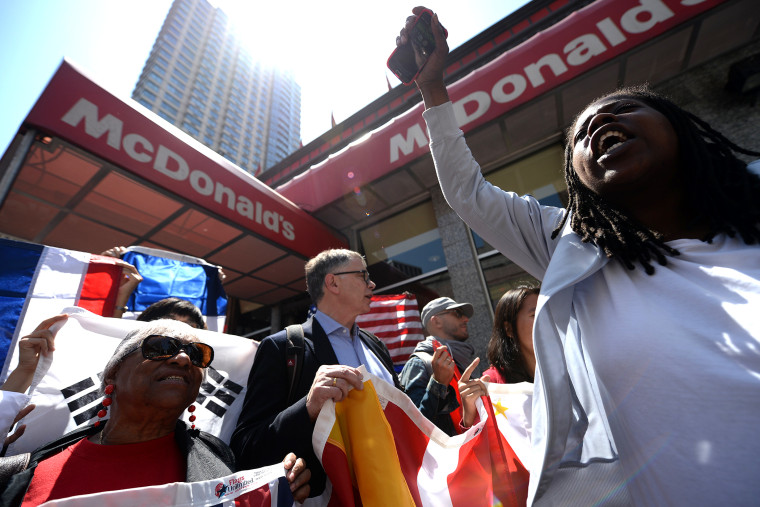Changing a global industry requires a global effort. And so the American fast food workers' movement is going global.
On May 15, after months of relative quiet, fast food workers in 150 American cities will again go on strike. Once again, they will demand that some of America's largest low-wage employers provide a base wage of $15 per hour and allow their workers to unionize. And once again, the striking workers will be joined on the picket lines by local politicians, community activists, and members of the clergy.
This strike, which KFC worker and movement organizer Naquashia LeGrand announced at a Wednesday rally, will likely be the biggest fast food labor action yet. In terms of the number of cities involved, it will certainly dwarf the previous record, a 100-city strike which took place in December. But perhaps more importantly, this will be the first labor action in the movement's short history to spill across national borders. As workers in the United States walk off the job, fast food employees on six other continents will rally in solidarity.
"I work hard enough, just like everybody else. So I deserve a fair wage to take care of my family, just like everybody else around the nation," said LeGrand. "We all deserve a living wage to take care of our families. There is no reason why we should be living in poverty. And that's the reason why we're going on strike."
First word of the latest strike came from Salon on Wednesday morning, but the formal announcement took place at the rally, in front of a McDonald's in lower midtown Manhattan. The crowd assembled behind LeGrand was not large, but it was diverse: Protesters held aloft flags from Morocco, Korea, Japan, Brazil, Ireland, and Switzerland, among others. The speakers who followed LeGrand included representatives from Italy, the United Kingdom, Denmark, and France. One of the final speakers led a chant in Arabic.
The American fast food workers voted on the date of the May 15 strike during a Monday night conference call, following the first night of an international fast food workers' conference held in New York. The following day, American workers announced to the conference, which was organized by the global union IUF, when the next strike would be.
Rep. Keith Ellison, D-Minn., was on the conference call when fast food workers voted to strike.
"There is something happening in America," he said in a statement. "Working families in Minneapolis, Detroit, Milwaukee, El Paso, Stockton and dozens of other cities are standing up and demanding the economy work for them. It’s clear from Monday’s call that this national movement isn’t going to stop until all working families have a fair shot to get ahead.”
Danish McDonald's worker Louise Marie Rantzau came to New York to attend the conference, and she spoke at Wednesday's rally. Danish McDonald's workers are unionized, she told msnbc, and employees who are over 18 make $21 per hour in American dollars.
"I can't understand how McDonald's can pay me a good wage and not do it in the U.S.," she said. "I have this feeling that McDonald's makes so much money, and it all goes in their pockets. So if they can afford it in Denmark, then they can afford it in the rest of the world."
Kader Diop, a unionized French McDonald's worker who was in town for the conference, said that he was taking a stroll through the city late last night and was "perplexed" to see hair salons open at ten in the evening, with low-wage barbers still working away. If they had a union, he said, that wouldn't be happening.
"In France we have a certain level of unionization that we've fought very hard for, where we've won certain things, and clearly in the United States they have a long way to go to get to that level," he said, through a translator, when asked if unionizing American fast food is possible. "But that's what they have to do. They have to struggle, build their union, and they can get there."
A statement on McDonald's corporate website, published during the December 5 strike, contends that the American fast food strikes are actually just "rallies" staged by "outside groups." When asked by msnbc whether they stand by that claim, a McDonald's spokesperson sent an email reiterating the statement word-for-word.
Fast food restaurants don't generally receive advance notice when workers are getting ready to strike, but LeGrand told msnbc she doesn't fear any preemptive intimidation or retaliation.
"That's just our way to show that we're not scared of you guys anymore. We're actually going to stand up regardless of whether you know or not," she said of the advance warning. "And that gives us a better way for us to let workers know that we stand up to these bosses, and they don't have to be scared. They can stand up with us."
